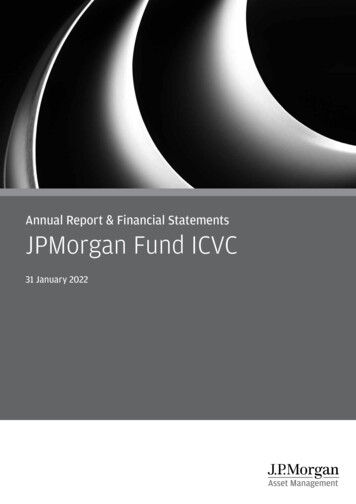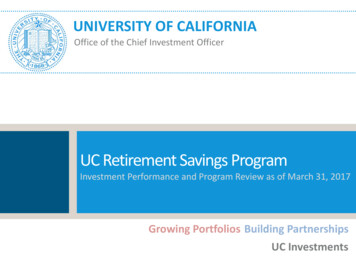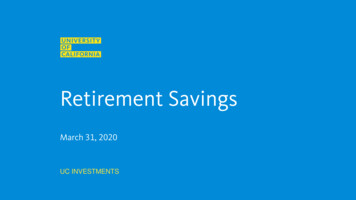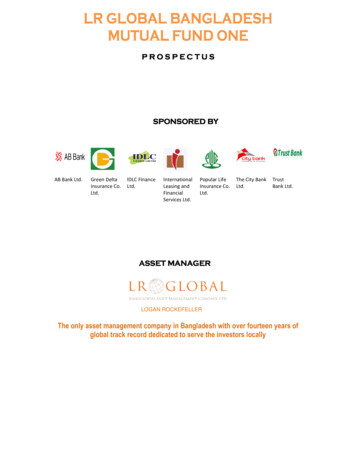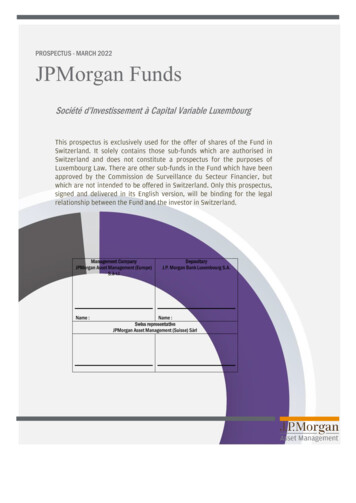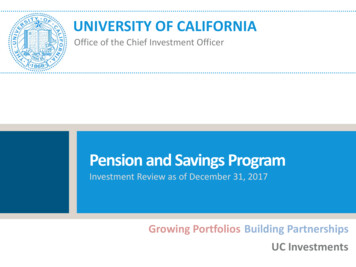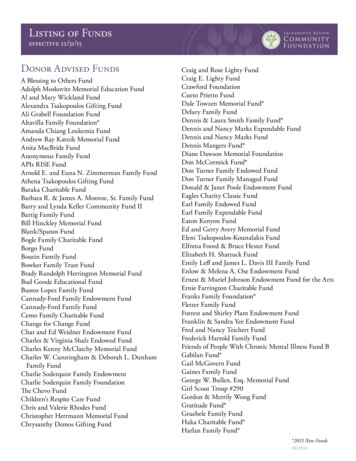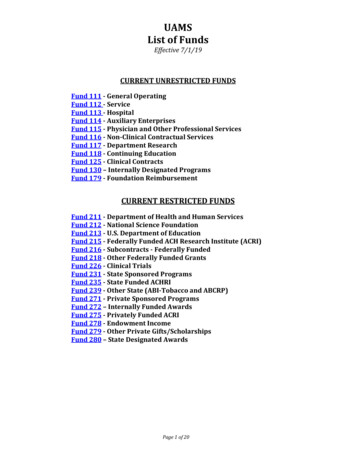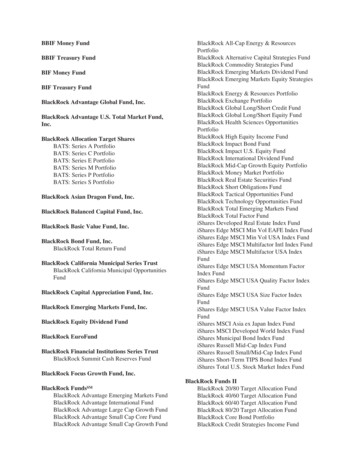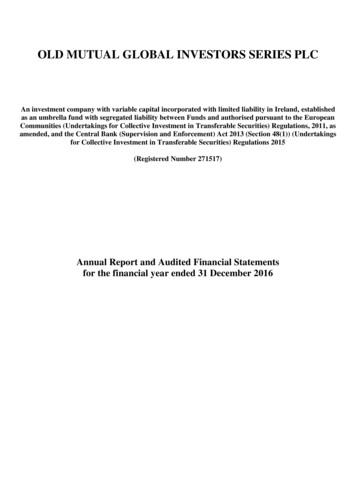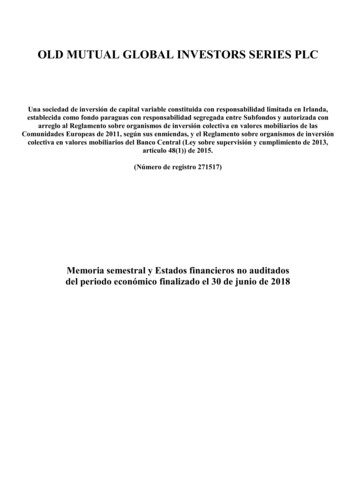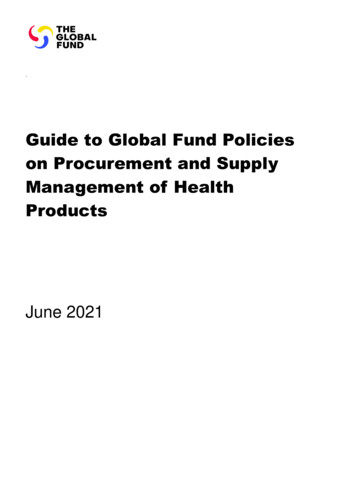
Transcription
.Guide to Global Fund Policieson Procurement and SupplyManagement of HealthProductsJune 2021
Table of Contents1.1.11.2IntroductionPurposeUpdates to The Guide and Further Guidance42.Ensuring Adequate Procurement and Supply Management of HealthProducts2.1 Applicable Laws2.2 Procurement and Supply Management Responsibilities2.3 Procurement Principles2.4 Quality Assurance Systems2.5 Adopting Global Data Standards2.6 Avoiding Diversion63.Capacity Assessment and Capacity Building / Technical Assistance94.4.14.24.34.44.54.6Purchasing Pharmaceutical Products10Compliance with National Laws And RegulationsCompliance with Clinical StandardsCompliance with Quality StandardsProcess for Procuring Pharmaceutical Products Reviewed by the Expert Review PanelMonitoring QualityAdherence to Treatment Protocols, Drug Resistance and Adverse Effects5.5.15.25.35.45.55.65.75.85.9Purchasing Diagnostic Products and Laboratory EquipmentGeneral PrinciplesCompliance With National RegulationsCompliance With Clinical StandardsCompliance with Quality StandardsProcess for Procuring Diagnostic Products Reviewed by the Expert Review PanelMonitoring QualityCompetitive Process for Diagnostic ProductsProcurement of Laboratory Diagnostic EquipmentMedical Laboratory Services136.6.16.26.3Purchasing Vector Control ProductsCompliance With National Policy For Management Of Vector Control ProductsProcurement of Public Health PesticidesProcess for Procuring Vector Control Products Reviewed by Expert Review Panel17Page 2 of 27Guide to Global Fund Policies on Procurement and Supply Management of Health Products
6.46.56.6Monitoring QualityCompliance with National Laws and RegulationsProcurement of Equipment for Vector Control7.7.17.2Purchasing Male and Female CondomsProcurement of Male and Female CondomsMonitoring Quality of Male And Femal Condoms198.Purchasing Core Personal Protective Equipment208.1 Compliance With National Policy8.2 Procurement of Core Personal Protective Equipment8.3 Process for Procuring Core Personal Protective Equipment Reviewed by Expert ReviewPanel8.4 Monitoring Quality8.5 Compliance with National Laws and Regulations9.Purchasing Other Health Products2210.Waste Management2211.Reporting Price and Quality23Definitions24Acronyms27Page 3 of 27Guide to Global Fund Policies on Procurement and Supply Management of Health Products
1.Introduction1.1Purpose1.1The purpose of this guide is to outline the policies and principles that govern the procurement and supply managementof health products financed by the Global Fund. The provisions of this guide are incorporated by reference into the grantagreement between the grant recipients and the Global Fund pursuant to the Global Fund Grant Regulations (2014)1.As used in this guide, the term “health products” includes: (i) pharmaceutical products; (ii) durable and non-durable invitro diagnostic products, microscopes and imaging equipment; (iii) vector control products; and (iv) consumable/ singleuse health products (including condoms, insecticides, therapeutic nutritional support, personal protective equipment andmedical devices, general laboratory items and injection syringes), which are financed out of the grant funds.1.2The responsibility for carrying out the program, and therefore for the award and administration of contracts financedunder the program, rests with the grant recipient. The grant recipient under a grant agreement with the Global Fundmay, through separate contractual arrangements require other implementers (e.g. sub-recipient/s, sub-sub recipient orprocurement agent), to fulfil certain obligations, but under the terms of the grant agreement the grant recipient remainsaccountable for compliance with obligations set out in the grant agreement and this guide. Arrangements entered intoby a grant recipient with sub-recipients, sub-sub recipients, manufacturers, procurement agents or other contractors shallcomply with this guide and incorporate relevant provisions. Unless the context requires otherwise, the term “recipient” or“recipients” used in this guide refer to the actors2 involved in procurement and supply management activities financedby Global Fund-supported programs.1.3Procurement and supply management activities are fundamental to program performance. In order to ensure accessto effective and quality- assured health products, the Global Fund has developed a set of policies and principles onprocurement and supply management, detailed or referenced in this guide that aim to:i.support the timely procurement of quality- assured health products in adequate quantities;ii.attain cost efficiencies in procurement and supply management activities;iii.ensure the reliability and security of distribution systems;iv.encourage appropriate use of health products; andv.enable the monitoring of all procurement and supply management activities.1.4As mentioned above, the provisions of the guide are incorporated by reference into the grant agreement. In theevent of non-compliance, the Global Fund reserves the right to exercise the remedies set out under the grantagreement.1.5In addition to elaborating the obligations that apply to the procurement and supply management of health productsfor Global Fund-supported programs this guide also sets out certain best practices which it strongly recommendsrecipients to apply in the procurement and supply management of health products.1.6This version replaces the November 2020 version of this guide.12See Section 5.2(1) of the Global Fund Grant Regulations (2014).Such as a grantee, Principal Recipient, sub-recipient, sub-sub-recipient or procurement agentPage 4 of 27Guide to Global Fund Policies on Procurement and Supply Management of Health Products
1.2Updates to The Guide and Further Guidance1.7This guide may be amended or updated from time to time at the Global Fund’s sole discretion, and is availablethrough the link below. Recipients are required to routinely check the Internet site of the Global Fund for updatesand comply with those updates. https://www.theglobalfund.org/en/ sourcing-management/policies-principles/1.8In this guide, users will find a useful list of Internet links to more detailed guidance documents relating to procurementand supply chain management.1.9Recipients are also expected to familiarize themselves with the information lists and notes relating to procurementand supply management of health products which are available at t/policies-principles/1.10 Recipients must follow the Quality Assurance Notices available at t/quality-assurance/information-notice/ related to products procured as per applicable Global Fund’spolicies on quality, procurement and supply management and other Quality Assurance requirements as per thepresent guide.1.11 The Global Fund may approve specific procurement of specific products which may derogate temporarily from (1)the Quality Assurance requirements laid down in this guide, which have been defined by, and are in the remit of,the Global Fund Secretariat (e.g., Core Personal Protective Equipment, condoms and medical devices for casemanagement of COVID-19) and (2) Board-approved requirements where such derogations have been authorizedby the Board (e.g., Pharmaceutical Products and Diagnostic Products) .1.12 A list of definitions and acronyms is set out at the end of this guide.Page 5 of 27Guide to Global Fund Policies on Procurement and Supply Management of Health Products
2.Ensuring Adequate Procurement and SupplyManagement of Health Products2.1Applicable Laws2.12.2When procuring and managing the supply of health products, recipients undertake to comply at all times withapplicable laws, including with any required authorizations relating to those health products in a timely mannerpursuant to the requirements established by the relevant regulatory authority in the country in which thoseproducts will be utilized.Procurement and Supply Management Responsibilities2.2The recipient may, except when otherwise required by the Global Fund, use its own procurement and supplymanagement systems, rules, processes and procedures or, at its own discretion, a contracted local, regional orinternational procurement and/or supply management agent, selected in a competitive manner to conduct healthproducts procurement and/or supply management. The recipient may also choose to utilize the Global Fund’sPooled Procurement Mechanism – including the e-procurement platform of wambo.org – to support recipients inattaining cost-effective and efficient procurement of health products.2.3For those health products for which the Global Fund determines that the recipient’s procurement and/or supplymanagement capacity is insufficient, the Global Fund may, in its sole discretion, require a recipient to use:i.the Pooled Procurement Mechanism3 orii.other established procurement and/or supply management agents or services acceptable to the GlobalFund.2.4In any case, where pooling of demand can attain better market outcomes (such as lower prices or improved leadtimes) for health products of the required assured quality, the recipient shall use its best efforts to use the PooledProcurement Mechanism or other regional and global procurement services or agents acceptable to the GlobalFund.2.5All procurement of medicines to treat multidrug- resistant tuberculosis shall be performed through a designatedprocurement agent of the Global Drug Facility. In advance of initiating procurement of such medicines, the recipientshall make available to the Global Fund, in form and substance satisfactory to the Global Fund, the following:i.a current detailed multidrug-resistant tuberculosis (MDR-TB) expansion plan (including the number of MDRTB patients to be treated and the list and quantifications of the medicines to be procured for the MDR-TBprogram reflecting the recipient’s finalized forecast for the grant implementation period covered by therelevant grant agreement), and the national guidelines for programmatic management of drug-resistanttuberculosis (DR- TB), both of which were developed in collaboration with a technical partner acceptable tothe Global Fund; andii.for each disbursement request for the procurement of MDR-TB medicines, a pro forma invoice issued by thedesignated procurement agent of the Global Drug Facility.3The Pooled Procurement Mechanism was previously referred to as the “voluntary pooled procurement” in Board Decision GF/B15/DP15, approved on 27April 2007.Page 6 of 27Guide to Global Fund Policies on Procurement and Supply Management of Health Products
2.62.3Whenever the recipient plans to procure pediatric antiretroviral (ARV) medicines to treat children infected withHIV using grant funds, to facilitate the adequate and timely supply of those medicines, the recipient has anobligation to procure those medicines through one of the procurement entities that is a member of the ARVProcurement Working Group.4Procurement Principles2.7The procurement of goods and services, including in particular health products, with grant funds shall be conductedin a manner that is based on the principles set out below:i.Value for money: Procurement shall be conducted with the aim of obtaining value for money. In particular,the Global Fund will not finance health products purchased at a price higher than the reference price for suchproducts, where one exists. Such reference price is set based on the globally negotiated price lists andcatalogue of the Global Fund for specific health and non-health products, either via the Pooled ProcurementMechanism (e.g., through wambo.org), prices negotiated by partners or through partner platforms such asStop TB Partnership’s Global Drug Facility. Please see the Global Fund Guidelines for Grant Budgeting (asamended from time to time) for more details;ii.Competition: Procurement shall be carried out on a competitive basis to the maximum practical extent;iii.Efficient and Effective Procurement: Procurement shall be conducted in a manner that maximizes theefficient use of Global Fund resources and ensures that the goods and/or services procured effectively meetthe requirements of the users;iv.Impartiality, Transparency and Accountability: Procurement shall be conducted in an impartial,transparent and accountable manner; andv.Procurement ethics: Procurement shall comply with Global Fund’s Code of Conduct for Suppliers,5 andCode of Conduct for Recipients of Global Fund Resources.62.8Recipients shall ensure that all procurement and supply management activities for health products adhere to theWHO Interagency Guidelines: Operational Principles for Good Pharmaceutical Procurement 7.2.9In accordance with good pharmaceutical procurement practices, each recipient shall use transparent andcompetitive procedures for the purchase of health products in order to achieve value for money. National ordomestic preference in procurement decisions is not acceptable to the Global Fund, except if mandatory underapplicable laws.2.10 Recipients will use their best efforts to apply national laws and applicable international obligations in the field ofintellectual property including the flexibilities provided in the [TRIPS] agreement and interpreted in the Dohadeclaration in a manner that achieves the lowest possible price for products of assured quality.2.11 Recipients shall establish and at all times maintain systems acceptable to the Global Fund to monitor theperformance of contractors, agents, manufacturers and sub-recipients conducting procurement and supplymanagement activities.2.12 Recipients shall provide immediately, whenever requested by the Global Fund, all contractual documentationgoverning each transaction.4More information on the ARV Procurement Working Group is available at nt/healthproducts/antiretrovirals/5Available here: es/6Available here: es/7Interagency Guidelines: Operational Principles for Good Pharmaceutical Procurement. WHO Geneva, 1999 available at www.who.int/3by5/en/who-edmpar-99-5.pdfPage 7 of 27Guide to Global Fund Policies on Procurement and Supply Management of Health Products
2.13 Where practices differ from the WHO Interagency Guidelines, recipients shall demonstrate compliance withcomparable systems for competitive bidding within a group of prequalified manufacturers, transparency andaccountability to those systems, and the application of necessary quality assurance mechanisms, all of which shallbe acceptable to the Global Fund.2.4Quality Assurance Systems2.14 The recipient shall designate a Quality Assurance (QA) Focal point. This focal point would be charged withensuring that the grant recipient is in compliance with Global Fund QA policies and requirements for theprocurement and supply management of health products.2.15 Recipients shall ensure that the procurement of health products complies with the principles set forth in the WHOModel Quality Assurance System for Procurement Agencies (MQAS) 8 and shall develop and fully maintain at alltimes a Quality Assurance system in accordance with those principles.2.16 Recipients should ensure that the relevant norms and standards which are necessary for the adequateimplementation of the MQAS are established and implemented.2.17 Recipients shall comply with, and shall ensure that each of its contractors, agents, and sub-recipients comply with, theWHO Guide for Good Storage Practices9 and WHO Good Distribution Practices.102.18 Upon request by the Global Fund, recipients shall provide samples of any health products procured with Global Fundresources to the Global Fund’s sampling agent and shall collaborate with such agent for sampling and testing activities.Sampling related costs will be covered by the Global Fund.2.5Adopting Global Data Standards2.19 The use of global data standards is a strategic enabler for supply chain efficiency, effectiveness and innovation fornumerous industries across the globe. To improve traceability and end-to-end visibility of health products throughoutthe supply chain, identify and implement efficiencies of the supply chain, ensure supply chain security and improvepatient safety, and ultimately, enhance availability of health products at service delivery level, the Global Fund hasadopted Global Data Standards (GS1) for product identification, location identification, and product master data.2.20 The Global Fund, in collaboration with key stakeholders, will introduce GS1 standards as part of its procurementrequirements and will support country uptake of these standards.112.21 An implementation plan is being developed to roll out such standards in a phased manner. In accordance withthis implementation plan, the Global Fund will require recipients to include a formal requirement to comply with8WHO Model Quality Assurance System for Procurement Agencies (MQAS), available atwww.who.int/entity/medicines/areas/quality safety/quality assurance/TRS986annex3.pdf?ua 1/9WHO Guide to good storage practices for /quality safety/quality f10WHO good distribution practices for pharmaceutical products.www.who.int/medicines/areas/quality safety/quality f11 From the Interagency Supply Chain Group (ISG): Visibility for Health Systems: Adoption of Global Data Standards (GS1), ISG position paper, lobal-data-standards-gs1Page 8 of 27Guide to Global Fund Policies on Procurement and Supply Management of Health Products
GS1 standards in their contracts with health products suppliers. Recipients are already encouraged to use GS1standards for product identification and traceability.2.6Avoiding Diversion2.22 Recipients shall ensure that operating procedures and controls acceptable to the Global Fund are put in place andare in full force at all times in order to prevent any diversion of health products throughout the supply chain,including the establishment and maintenance of reliable receiving procedures (with a process for reconciliationand confirmation of orders/ deliveries) and inventory management, internal audit systems, and good governancestructures to ensure the sound operation of these systems.3. Capacity Assessment and Capacity Building /Technical Assistance3.1Due to the complexity and significant risks associated with procurement and supply management activities,recipients are only authorized to proceed with procurement and supply management activities after:i.the Global Fund has assessed the recipient’s capacity to manage procurement and supply managementactivities under the program;ii.the recipient has submitted to the Global Fund the required set of documents relating to procurement andsupply management of health products, as required, consistent with Global Fund policies;12 andiii.approval by the Global Fund of the applicable list of health products they intend to purchase with grantfunds, including any and all related procurement and supply management costs and implementationarrangements. Further guidance is available at https://www.theglobalfund.org/en/ ts shall ensure that at all times the procurement and supply management activities to be financed by GlobalFund-supported programs are carried out in accordance with the applicable list of health products and procurementand supply management arrangements, as approved by the Global Fund. If the recipient plans to make any changesto the list of health products or the procurement and supply management implementation arrangements, asapproved by the Global Fund, it shall provide in advance details of those proposed changes to the Global Fund andshall not initiate those changes unless they have been approved by the Global Fund.3.3Short-term and long-term capacity building or technical assistance might be needed in order to strengthen systemsand address challenges related to, but not restricted to selection, quantification/forecasting, procurement planning,storage, inventory control, logistics management information systems, quality assurance systems, including qualitycontrol, and intellectual property management. Additionally, recipients may wish to consider measures to strengthenthe capacity of national institutions, such as medical stores and national regulatory authorities and other in-countrymechanisms, systems and tools. Recipients are referred to the Global Fund information about Health SystemsStrengthening for Global Fund Applicants,13 the Guidelines for Grant Budgeting and Annual Financial Reporting1412Further guidance on grant-making is available at: lying for Funding – Health Systems Strengthening for Global Fund Applicants, available athttps://www.theglobalfund.org/media/4759/core resilientsustainablesystemsforhealth infonote en.pdf14Finance and Audit – Guidelines for Grant Budgeting and Annual Financial Reporting, available athttps://www.theglobalfund.org/media/3261/core budgetinginglobalfundgrants guideline en.pdf13Page 9 of 27Guide to Global Fund Policies on Procurement and Supply Management of Health Products
(as amended from time to time), Guidance Note on Sustainability, Transition and Co-financing (Annex V: HealthProduct Management (HPM) and Sustainability),15 and the Operational Policy Manual.164.Purchasing Pharmaceutical Products174.1Compliance with National Laws And Regulations4.14.2Recipients have an obligation to ensure that finished pharmaceutical products (for the purposes of this guide, thisrefers to pharmaceutical products financed out of grant funds) comply with the relevant quality standards establishedby the national pharmaceutical regulatory authority in the country of use, including authorization for use of the finishedpharmaceutical products to be procured following its standard practices for registration18 or other forms ofauthorization (such as authorizations for marketing or importation).Compliance with Clinical Standards4.2Recipients are not authorized to procure medicines using grant funds unless those medicines appear in the currentnational, institutional and/or WHO Standard Treatment Guidelines and/or Essential Medicines Lists. Recipientsshall provide a copy of the relevant standard treatment guidelines or essential medicines list with the procurementplan or the procurement and supply management plan provided in advance to the Global Fund.4.3If a recipient plans to procure a medicine that: (i) was not specified in the grant proposal approved by the GlobalFund; and/or (ii) is included in the relevant standard treatment guidelines or essential medicines list of the country,but not included in the WHO standard treatment guidelines or essential medicines list, or vice-versa, the recipientshall seek Global Fund’s approval by providing a technical justification prior to launching the procurement process.4.4Recipients shall procure artemisinin-based combination therapy (ACTs) for the treatment of uncomplicated malariaonly as fixed-dose combinations after they have received written notification from the Global Fund of the availabilityof at least two fixed-dose combination products that comply with the relevant quality assurance policy. 1915Available at: https://www.theglobalfund.org/media/5648/core sustainabilityandtransition guidancenote en.pdf16Operational Policies – Operational Policy Manual, available at: https://www.theglobalfund.org/media/3266/core operationalpolicy manual en.pdf17All information related to the Global Fund Quality Assurance Policy for Pharmaceutical Products is available ment/quality-assurance/medicines/18In order to expedite the authorization of use for needed finished pharmaceutical products, national pharmaceutical regulatory authorities are encouragedto accept, as relevant, the following documentation (together with all necessary information to perform quality control testing of the products and withnecessary reference standards): a) for finished pharmaceutical products that have been prequalified by the WHO Prequalification Programme, theprequalification approval letter and supporting documentation, including WHO prequalification report and the manufacturer’s summary of informationrelating to quality, safety and efficacy; and b) for finished pharmaceutical products that have been authorized for use by a Stringent PharmaceuticalRegulatory Authority, the executive summary of the Common Technical Document for the Registration of Pharmaceutical Products for Human Use, or itssections relating to quality, safety and efficacy.19GF/B23/DP22: Expediting Transition to Fixed-dose Combinations of Artemisinin-based Combination Therapies (ACTs), Twenty-Third Board Meeting,Geneva, Switzerland, 11 -12 May 2011Page 10 of 27Guide to Global Fund Policies on Procurement and Supply Management of Health Products
4.3Compliance with Quality Standards4.5In addition to national requirements, all ARV, antimalarial and anti-tuberculosis pharmaceutical products shallbe:20i.prequalified under the WHO Prequalification Programme (Option A); and/orii.authorized for use by a Stringent Regulatory Authority (Option B); oriii.if only one or no Option A or Option B product is available 21, permitted for time- limited procurement afterreview by the Expert Review Panel (ERP).4.6The Global Fund maintains on its website non-exhaustive lists for orientation purposes indicating finishedpharmaceutical products known to the Global Fund to be compliant with the above requirements, as per theapproved indications. Such lists are updated monthly and are available at nt/quality-assurance/ medicines/4.4 Process for Procuring Pharmaceutical Products Reviewed by theExpert Review Panel4.7Before procuring finished pharmaceutical products that have been subject to a review by the Expert Review Panel,recipients shall inform the Global Fund in writing by submitting a duly completed notification form22. Procurement ofproducts examined by the Expert Review Panel can only proceed after the recipient receives a “no objection” letterfrom the Global Fund for the requested selection, and the relevant procurement contract shall not exceed twelvemonths.4.8As per paragraph 31 of the Global Fund Quality Assurance Policy for Pharmaceutical Products, recipients shallinform the Global Fund in writing of each consignment of ERP products which is subject to randomized testingand release according to Global Fund published guidance.4.5Monitoring Quality4.9Recipients shall monitor, or shall take measures to ensure adequate monitoring of, the quality of pharmaceuticalproducts throughout the supply chain.4.10In collaboration with the relevant national pharmaceutical regulatory authority, recipients shall arrange for randomsamples of finished pharmaceutical products to be taken at different points in the supply chain, from the point ofinitial receipt of the products to delivery to patients.4.11Recipients shall arrange for those samples to be sent for quality control testing to national or other laboratoriesthat are:i.prequalified by the WHO Prequalification Programme (as published by the WHO on a regular basis); and/orii.accredited in accordance with ISO17025.4.12Recipients may request the Global Fund to include the cost of conducting quality control activities within thebudget, as part of the procurement and supply management cost, for the relevant program.20For quality assurance requirements applicable to COVID-19 Pharmaceutical Products, recipients must refer to the Interim Guidance: Interim QualityAssurance Requirements for the Procurement of COVID-19 Pharmaceutical Products, which is available at: oduct-supply/#quality-assurance.21Available means that the relevant manufacturer can supply the requested quantity of the finished pharmaceutical product within not more than 90 days ofthe requested delivery date.22All information related to the Expert Review Panel process, including instructions to follow to procure an Expert Review Panel-reviewed product, isavailable at nt/quality-assurance/expert-review-panel/Page 11 of 27Guide to Global Fund Policies on Procurement and Supply Management of Health Products
4.13Recipients are required to provide to the Global Fund, or arrange for the provision of, the results of quality controltests. Recipients shall make the necessary arrangements to ensure the Global Fund is authorized to use theseresults. In case of product non-compliance, recipients are required to provide the same within five working daysto minimize the risk of exposure to the patient23.4.14If a recipient plans to procure a finished pharmaceutical product which has been evaluated and recommended forprocurement by the Expert Review Panel, the Global Fund will arrange for and finance the quality control testingprior to delivery to the recipient.24 The recipient shall ensure that any contract with a manufacturer relating to theprocurement of those products specifically allows for the Global Fund, its representatives or agents to undertakesampling, to obtain the manufacturer’s specifications, and to make the results of such testing public.4.15 Further guidance relating to quality monitoring of pharmaceutical products is available in the Global Fund’s Guidancefor In-country Quality Monitoring of Pharmaceutical Products in Global Fund-supported Programs.254.16 Recipients shall develop and maintain a system acceptable to the Global Fund for reporting to the appropriateregulatory authorities any defects relating to phar
procurement and supply management, detailed or referenced in this guide that aim to: i. support the timely procurement of quality- assured health products in adequate quantities; ii. attain cost efficiencies in procurement and supply management activities; iii. ensure the reliability and security of distribution systems; iv.
